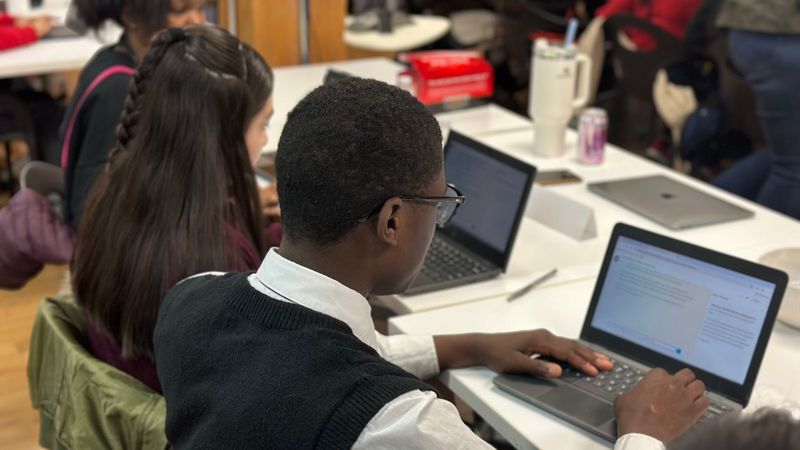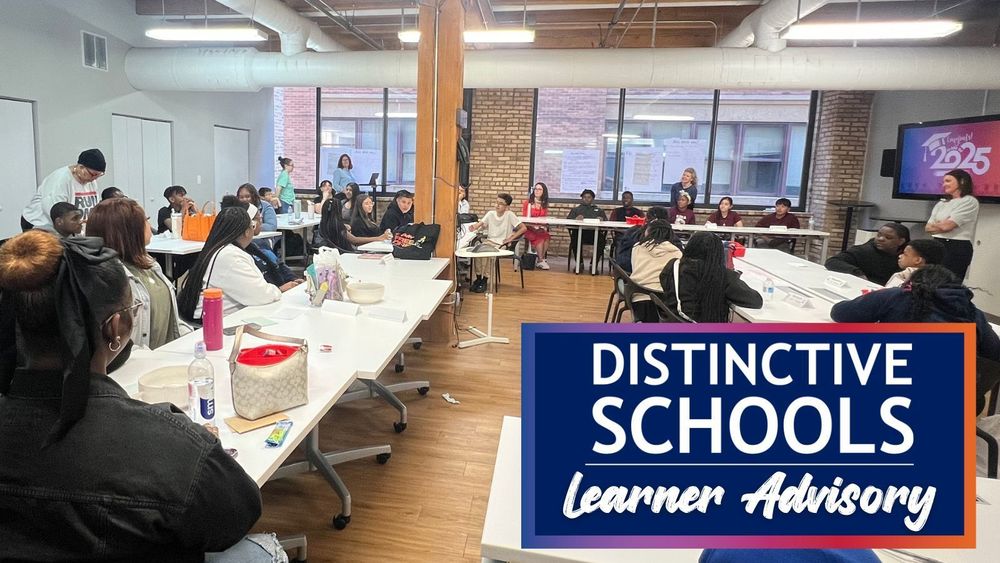This is Part II in a three-part blog series exploring how Distinctive Schools is approaching artificial intelligence (AI) in education. From building custom tools to supporting student learning, our staff and students are beginning to thoughtfully explore AI’s potential. Read Part I here.
How are schools preparing students for a world rapidly being reshaped by Artificial Intelligence? At Distinctive Schools, the answer goes beyond lessons about AI—it means hands-on exploration, critical thinking, and educator-guided experiences that spark curiosity and purpose. As our team has started playing and creating with AI this year, it’s been just as important to have our scholars start developing literacy around ethical, safe AI use. That’s why during our Learner Advisory, we invited students to dive into AI firsthand, tackling real-world school challenges with an AI chatbot our team built in Playlab.
Before diving into the session, students discussed their existing knowledge of AI, how they already use it in their daily lives, and what questions they had. 98% of our scholars shared that they're consistently using AI for homework help, creative endeavors, and even just for fun, with 100% of the learners in the room having been actively experimenting with AI on their own—a testament to their innate curiosity and drive.
In the first Learner Advisory session, our scholars discussed what appropriate use of AI looks like, touching on how AI can be wrong, various ethical considerations over data privacy, and what long term impacts of AI could look like. From there, students were introduced to an AI chatbot, tasked with finding solutions to issues they face at school. The questions they posed were thoughtful, insightful, and incredibly practical, highlighting how they see AI as a tool for growth and self-advocacy. They asked questions like, "How would I pitch an idea/reason as to why I should be a captain for a school sport?," and, "Is there a healthy snack that is not only good but can help with health?" They also explored how to make learning more engaging, with questions such as, "I want to feel more interested in reading class, in what ways can I feel more engaged?," and, "How would I be able to be more engaged with learning for my history class with a learning disability?"
The biggest themes that emerged from their inquiries centered on effective communication, like how to talk to teachers and administrators about their needs and ideas. They also focused on engaging learning, asking for ways to make their educational experience more captivating, and self-advocacy, exploring how they can better advocate for themselves, whether it's discussing stress at school or enhancing study time.
During the next advisory session, the AI Expanded Design Team invited students to provide feedback on the forthcoming Distinctive Schools AI Playbook. Through a gallery walk, students explored four key areas: AI limitations, citing sources, respecting intellectual property, and reporting concerns. Our scholars added thoughtful ideas, including clearer reporting tools and ways to explain inappropriate AI use. They also raised important questions around accuracy, ownership, safety, and tool access. Their feedback from this session is shaping how we integrate AI responsibly across our network through this playbook.
One of the greatest takeaways from our Learner Advisory was their thoughtful vision for how AI should support their education. While they’re excited about AI’s potential, they were just as clear about its limits—emphasizing that strong relationships, trust, and connection with their teachers must remain at the center of learning. In fact, 100% of our students agreed that grading should always come from their teachers, not AI.
This powerful feedback underscores our philosophy at Distinctive Schools. We believe AI is a powerful tool to enhance learning, foster critical thinking, and prepare students for the future while never replacing the invaluable connection, guidance, and humanity of our educators. Our students are actively shaping the conversation around its ethical and effective integration into their educational journey. This is how we’re preparing students to thrive in a future shaped by both innovation and humanity—together.

Integrating AI at Distinctive Schools: Helping Students Navigate Responsibly
June 10, 2025
